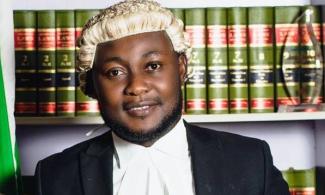
The Cybercrimes (Prohibition and Prevention) Act was signed into law on May 15, 2015, by former President Goodluck Jonathan at the twilight of his administration.
Barrister Pelumi Olajengbesi, Managing Partner at Law Corridor has criticised the amendment of the Cybercrimes Act 2015, stressing that the law was manipulated to suppress press freedom and freedom of expression.
Olajengbesi said this in Abuja on Saturday at the Nigeria Union of Journalists (NUJ) Correspondents’ Chapel end-of-year symposium, with the theme, ‘Understanding the Cybercrime Act 2015, The Media ethics perspective’.
The Cybercrimes (Prohibition and Prevention) Act was signed into law on May 15, 2015, by former President Goodluck Jonathan at the twilight of his administration.
The law was enacted based on the understanding that threats to information and communication technology are a danger to Nigeria’s national security, affecting the country’s “economic, political, and social fabric”.
The Act also seeks to ensure the protection of critical national information infrastructure and promote cybersecurity and the protection of computer systems and networks, electronic communications, data and computer programmes, intellectual property and privacy rights.
However, Olajengbesi maintained that the political class deliberately manipulated the provisions of the law to police journalists and suppress freedom of expression and thoughts, while abandoning its primary objectives.
While harping on the need for journalists to be vigilant to the ethical standard of the profession, he stressed that free media is crucial to a true democracy.
He said, “It is, therefore, crucial to submit and caution that the imperative of enacting the Cybercrime Act was not to regulate the activities of journalists. Journalism is a renowned and decent profession with high ethical standards. It is one of the noblest and oldest since the days Rome circa 59 Before Christ.
“However, no one who indulges in the activities criminalised by the Cybercrime Act can be rightly referred to as a journalist.
“That said, it is sad to note that Government and the political class in Nigeria have deliberately manipulated the provisions of the Cybercrime Act to police journalists and suppress freedom of expression and thoughts, while abandoning the primary objective of the law.
“Authorities in Government have attempted to silence opposition views in the online media through arbitrary interpretation and abuse of the Cybercrimes (Prohibition and Prevention) Act, 2015, particularly section 24 of the Act which addresses offensive and annoying statements on the internet otherwise known as cyberstalking, and several journalists, bloggers and individuals have been arrested in this regard.”
He, therefore, called on the government to apply the law properly to suit the sensibility for which it was enacted while also stressing the need for media houses, firms and practitioners to operate by the superintending ethics of the media profession.
“It is only the synergy of such demonstrable acts in good faith by government and the media that a proper and rewarding balance can be found in the media space,” Olajengbesi said.
Meanwhile, in their separate goodwill messages, representatives of Global Rights and the Centre for Journalism Innovation and Development (CJID), who attended the event, commended journalists for the job they are doing.
The Executive Director of Global Rights, Abiodun Baiyewu, represented by Edosa Oviawe, Programme Manager, Global Rights, said “only free press can hold government accountable to the people”.
Busola Ajibola, Deputy Director, Journalism Programme, CJID disclosed that the Centre had tracked 52 verified attacks meted out to journalists across the country in 2022 alone.
“We have a dedicated civic tool that we use in tracking attacks against journalists. This year alone, the verified attacks that we have tracked across the country are 52. These do not include attacks that we have not been able to document or the ones that did not even make it to the news.
Earlier in his opening remarks, Chairman of the Correspondents’ Chapel, Comrade Jide Oyekunle, said the NUJ would do everything within its power to ensure that journalists adhere to the rules of reporting.
“I want to assure you once again from this side that we will do everything within our power to ensure that our members adhere strictly to the ethics of the profession and also observe the extant laws regulating and guiding the operation of the media in Nigeria.
“We have continued to emphasize that journalism is not a crime, journalism is not an opposition, journalism is the oxygen of democracy and for the positive change and development of any democratic society.
“Nigeria Union of Journalists will be firm and resist any measure or action capable of threatening press freedom or infringing on the rights of any journalist in Nigeria, particularly Federal Capital Territory.
“We will continue to uphold and protect the fundamental objectives of the directive principles of the state policy as set out in Chapter 2 of the Constitution irrespective of the intimidation, harassment, persecution, and arrest,” Oyekunle said.